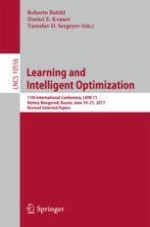This book constitutes the thoroughly refereed post-conference proceedings of the 11th International Conference on Learning and Intelligent Optimization, LION 11, held in Nizhny,Novgorod, Russia, in June 2017.
The 20 full papers (among these one GENOPT paper) and 15 short papers presented have been carefully reviewed and selected from 73 submissions. The papers explore the advanced research developments in such interconnected fields as mathematical programming, global optimization, machine learning, and artificial intelligence. Special focus is given to advanced ideas, technologies, methods, and applications in optimization and machine learning.
